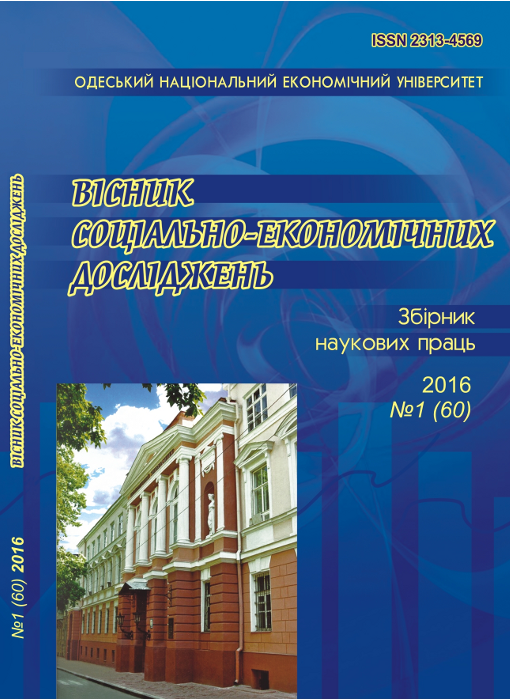Theoretical bases of science state management system formation and its impact on economic development of the nation
DOI:
https://doi.org/10.33987/vsed.1(60).2016.37-43Keywords:
economy of science, linear model of innovation, theory of technological change, second academic revolution, academic capitalism, «Mode 2» knowledge production, state management of scienceAbstract
The article investigates modern theoretical approaches to the analysis of the role of science and technology in economic development, including technological change theory, the concepts «academic revolution», «academic capitalism», «Mode 2» knowledge productionetc. The current tasks and forms of state regulation of science and technology sphere to enhance its impact on socio-economic development are outlined.
References
«On Recommendations of Parliamentary Hearings on «On the State and Legislative Provision of the Development of Country’s Science and Scientific and Technological Sphere: Law of Ukraine, No. 182, 26.02.2015» [Pro Rekomendatsii parlamentskykh slukhan na temu «Pro stan ta zakonodavche zabezpechennia rozvytku nauky ta naukovo-tekhnichnoi sfery derzhavy»: Postanova Verkhovnoi Rady Ukrainy, No. 182, 26.02.2015], available at: http://zakon4.rada.gov.ua/laws/show/182-19 (ukr)
Bunchuk, M. (1998), «The consequences of the commercialization of science» [Posledstviya kommertsializatsii nauki], Nauka i naukovedenie, No. 3, pp. 13–20 (rus)
Bernal, J. D. (1939), «The Social Function of Science», The Economic Journal, Vol. 49, No. 194 (Jun., 1939), pp. 319–321.
Arrow, K. (1962), «Economic Welfare and the Allocation of Resources for Inventions» / In Nelson, R. (ed.). The Rate and Direction of Inventive Activity, National Bureau of Economic Research, Inc., pp. 609–626.
Guston, D. and Kenniston, K. (1994), The Fragile Contract, MIT Press, Cambridge (MA), 258 p.
Diamond, A., M. (1996), «The Economics of Science, Knowledge and Policy», Summer/Fall, Vol. 9, No. 2 & 3, pp. 6–49.
Dasgupta, P., David, P. (1994), «Toward a New Economics of Science», Policy Research, Vol. 23, pp. 487–521.
Mirowski, Ph. and Sent, E.-M. (1997), «The Need for a New Economics of Science», Policy Research.
Mowery, D., ed. (1994), Science and Technology Policy in Interdependent Economies, Kluwer, Boston.
Rosenberg, N. (1994), Exploring the Black Box, Cambridge University Press, N.Y.
Ormala, E. (1997), New Approaches in Technology Policy – the Finnish Example, OECD Workshop on Best Practices in Technology and Innovation Policy, May, Vienna.
Etzkowitz, H. (1997), Entrepreneurial Science: the Second Academic Revolution, University of Notre Dame.
Slaughter, S. & Rhoades, G. (2004), Academic capitalism and the new economy: Markets, state and higher education, Johns Hopkins University Press, Baltimore, MD.
Slaughter, S. & Leslie, L. (1997), Academic capitalism: Politics, policies, and the entrepreneurial university, Johns Hopkins University Press, Baltimore, MD.
Gibbons, M. et al. (1994), The new production of knowledge: The dynamics of science and research in contemporary societies, Sage Publications, London.
Gibbons, M. (1995), The university as an instrument for the development of science and basic research: the implication of mode 2 science, Pergamon Press, Oxford, pр. 90–104.
Price, D. de S. (1963), Big Science, Little Science, Columbia University Press, N. Y.
Ziman, J. (1994), Prometheus Bound. Science in a Dynamic Steady State, Cambridge University Press, Cambridge.
Ballandonne, M. (2011), New Economics of Science, Economics of Scientific Knowledge and Sociology of Science: the Case of Paul David, Journal of Economic Methodology, Vol. 19, No. 4, December 2012, pp. 391–406.
Downloads
Published
Issue
Section
License
Copyright (c) 2016 Socio-Economic Research Bulletin

This work is licensed under a Creative Commons Attribution 4.0 International License.






